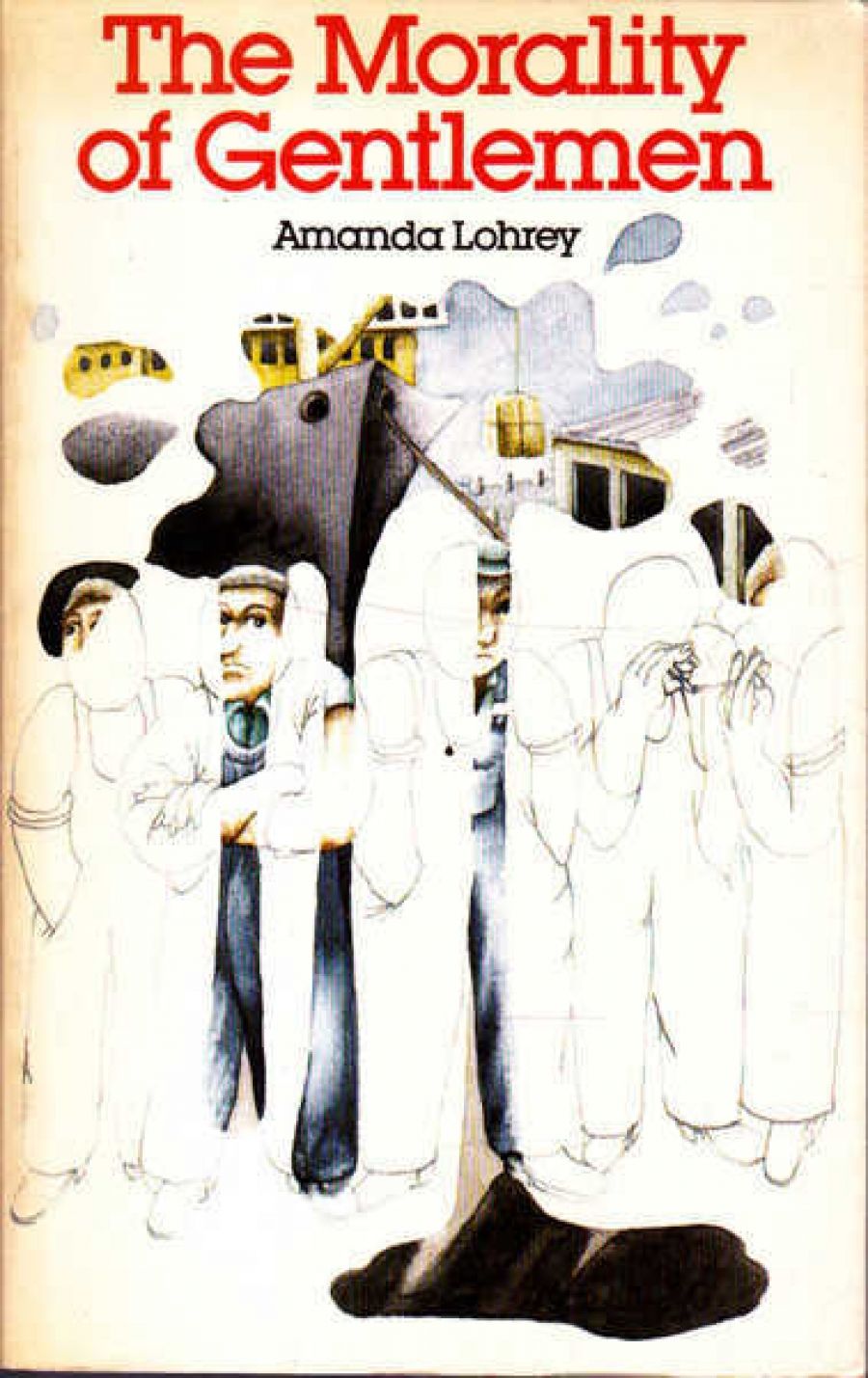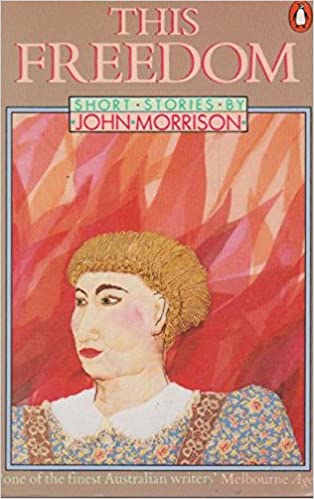
- Free Article: No
- Contents Category: Fiction
- Review Article: Yes
- Online Only: No
- Custom Highlight Text:
This fine first novel by a thirty-six-year-old Tasmanian woman was first published in 1984, but to the best of my knowledge has received only one review. Certainly, ABR missed it, and I would not have read it had it not been entered in the Vance and Nettie Palmer Victorian State Government awards for fiction. Had I been able to persuade my fellow judges of its merit, it would certainly have made the shortlist. Lohrey’s talent as a writer has finally been acknowledged in the latest issue of Scripsi, which prints an extract from the novel she is currently working on, as well as a substantial and thoughtful review by Anne Diamond.
- Book 1 Title: The Morality of Gentlemen
- Book 1 Biblio: Apcol, 243 pp
- Book 2 Title: This Freedom
- Book 2 Biblio: Penguin, 200 pp
- Book 2 Cover Small (400 x 600):

- Book 2 Cover (800 x 1200):

- Book 2 Cover Path (no longer required): images/1_Meta/Sep_2020/META/516GNUNXPeL._SX312_BO1,204,203,200_.jpg
The two men refused to pay a compulsory levy to the ALP demanded by the Waterside Workers’ Federation. The wharfies refused work with the dissenters; Menzies (who appears here in a guest appearance) used the opportunity to try and break the back of the union and hence of all unions, and at the same time the Movement, the extreme right wing organisation with close links with the Catholic Church, also exploited dissenters to publicise the evils of Communism and the alleged power it was gaining over the unions. It was a time when the Red Menace was at its height and any communist was thought automatically to have close links with and be working for Russian bosses.
What Lohrey has brilliantly done is to reconstruct the period with what has obviously been very thorough and intense research. She uses a few real names, such as that of Menzies, but most of the characters are fictionalised. For instance, the rebels are named (with fine irony) Mosely – Victor and his silent son Russell. Mannix is mentioned but the Catholic arch bishop in the novel is a cynical and opportunistic man. Santamaria is not mentioned.
It is a vivid and dramatic recreation. There is a brilliant series of sketches of the many characters involved in the events. Particularly striking are the portraits of Leo Eyenon, the sceptical state president of the union, who has had a falling out with the communist officials; Tommy Quinn, a young puritanical communist who is centrally involved in the case and who rejects his mistress Rachel Conlan when it becomes clear that she will impede his career in the Party; Senator Bertie Baker, right-wing fanatic but skilful lawyer who appears for the Moselys; Nigel Conlan, lawyer for the union, who loses the case but advances his career; Mosely himself, a foul-mouthed, fanatical, but in some ways sincere man; his friend and only supporter Doonlan who commits suicide under the strain of the whole ordeal. It is astonishing, in fact, how many vivid characterisations there are in the novel and how convincingly the sense of the period is recreated, although there are some odd (and perhaps deliberate) anachronisms, such as speaking of dollars instead of pounds.
Either Lohrey or her publishers call the novel ‘Brechtian’, which is why I suspect the mention of dollars may be a deliberate alienating device, but it is not more Brechtian than Brecht. There is a List of Characters. There is a narrator, a young male history researcher who conducts interviews with the survivors of the case. He tells us; ‘Before going further I think I should make clear my approach’ but in fact these and other interruptions hardly impede the drive and sweep of the action and the novel is extremely absorbing on the most fundamental level of all – that of wanting to turn to the next page.
Lohrey does not comment specifically on the action but she makes it very clear where her sympathies lie. The Movement representatives in the novel are corrupt fanatics, cynically exploiting Mosely for their own ideological purposes. The Union leaders are for the most part fairly sincere men whose fallings out among themselves and pettinesses arise largely from intellectual conviction. Jim Travers, the federal president of the union, is the most impressive of them all and a superbly achieved characterisation, even though he makes only about three brief appearances.
Lohrey takes a sardonic, sceptical view of motivation but she does not fall into the trap of being cynical. Even Quinn’s abandonment of Rachel, cruel as it is, arises out of his somewhat narrow idealism as well as his political ambition. One thing that the novel makes emphatically clear is that this world has no place in it for women. Female characters make only brief and peripheral appearances and those few interested in power have it specifically denied them. Of Dorothy Jeakins, wife of the state secretary, we are told that
‘Every year she runs for a position of the State Committee and every year she’s defeated by the men. She quotes the example of Rosa Luxemburg to them but it doesn’t make any difference. Your turn will come comrade, says Plunkett, but not yet. Meanwhile he directs her to reforming the petty-bourgeois elements of the Housewives Association.’
This kind of impassive reporting is the nearest the novel comes to making judgements, and the rather heavy-handed irony suggested in the title is not present in the novel itself. Despite the efforts of such writers as Frank Hardy and Dal Stivens, the genre of the political novel is a rather impoverished one in Australia. This novel represents a very real and distinguished addition to it:
One day someone will explain the marketing principles of publishing to me – I assume that marketing in some form or other is responsible for the puzzling nature of the reissue of most, though not all, John Morrison’s short stories.
Apart from two novels which he wrote while on Commonwealth Literary Fund Fellowships, Morrison is the author of several collections of short stories: Sailors Belong Ships (1947), Black Cargo (1955), 23 (1962), Selected Stories (1972, which reprints some of the earlier stories as well as adding new ones), and Australian By Choice (1973), a selection of autobiographical pieces and sketches but with a few stories, one of which appears in his book.
What Penguin have done is to reprint some forty-odd stories in three differently titled volumes, North Wind (1982), Stories of Waterfront (1984), and now This Freedom, which contains sixteen stories, two of which had been published but not in book form previously. These, ‘Bushfire’ and ‘Appointment at Princess Gate’, are the only two which were new to me. One story, ‘The Night Shift’, appears in two out of the three collections and although the strong theme of Stories on the Waterfront makes it logical to put those stories together, at least three of Morrison’s stories deeding with the waterfront were omitted from that volume – ‘A Coat for a Sailor’, ‘Lena’ and ‘Ward Four’. Got it?
At any rate, it’s good that they are back in print, by whatever means. Most of Morrison’s stories can be traced to the experiences at each of a given number of periods in his life and in fact it might have been more logical to rearrange the stories to reflect that history: not, in other words, according to when they were written but to the period in his life with which they deal. There are his experiences in the outback when he first returned to Australia, reflected here in ‘The Prophet of Pandaloop’, his struggle as a young married man during the Depression years and after (in, for instance, ‘Christ the Devil and the Lunatic’), the pride he takes in unionism (‘The Ticket’), his work as a wharfie, his gardening stories and the stories of life in the Dandenongs and Frankston, with the ever-present threat of bush fire being describes dramatically here in ‘Bushfire’ and ‘This Freedom’ as well as in the title story of North Wind. Finally, there are the commuter stories, such as ‘The Blind Man’s Story’, the stories Morrison worked up from his careful observation, of fellow passengers on the train to and from Flinders Street; and although the author himself has never won Tattersall’s no list is complete without mention of the Tatts stories such as ‘It Opens Your Eyes’, a series of variations on the theme of the consequences to friendship when two men win Tatts on a shared ticket.
The fact of the Tatts stories is significant because as critics such as Stephen Murray-Smith have noted Morrison’s stories tend to hinge very often on a moral choice, on that moment in an individual’s life when the decision he makes (it is usually a ‘he’) will reveal what kind of man he is, to what degree he will stand by his principles or compromise them. In ‘It Opens Your Eyes’ a man refuses to accept the five bob he is owed by a mate, who buys him a ticket in Tatts instead. When the ticket wins, the two have a falling out over whether they should share the £10,000 and if so in what proportion; significantly, the rift is initiated by the winner’s wife.
In ‘The Prophet of Pandaloop’, a churlish squatter’s faulty moral choice opens his young wife’s eyes fatally to his true nature.
The story in which the question of choice is confronted most explicitly, even schematically, is ‘Christ, the Devil and the Lunatic’. It is the Depression and the young narrator and his wife and two kids are nearly starving until he lands a particularly unpleasant job, that of minding a mentally deficient man for a miserable wage. The humiliations the lunatic inflicts on him are made worse by the fact that each day the patient is given money to spend on whatever rubbish he likes. One day, the narrator cracks and takes some of it to buy food for his kids, and that night he and his wife, who has guessed where the money has come from, have a quarrel. He is an atheist but she is a deeply devout Christian who has demanded that he behave with total honesty at all times, even when starving.
The story moves on from there to its resolution but in a way that kind of dilemma is there in some form in many of the stories. Morrison picks his way through tangled moral lines with care and wisdom. The authorial persona is very often a wise, extremely perceptive observer, tolerant and patient but not slow to discern and to judge privately. They are well-crafted, lucidly written stories that reveal a distinctive vision of the world.
Now that most of them have been collected, perhaps Penguin or some other publisher can complete the job by reprinting the various autobiographical pieces that appeared in Australian by Choice and more recently in various periodicals. The only problem would be what to call the book.


Comments powered by CComment